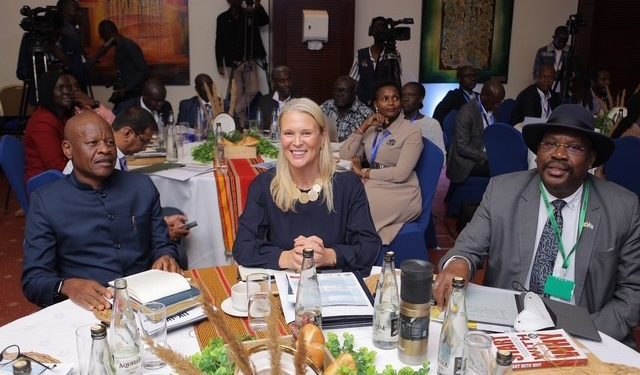Uganda has set its sights on boosting agro-exports to $20 billion by 2040, with the United Kingdom positioned as a key partner in achieving this ambitious goal.
General Wilson Mbadi, Minister of State for Trade, Industry, and Cooperatives, revealed the plan during the UK-Uganda Agro-Industrialization Forum held at the Serena Hotel in Kampala.
He said Uganda will rely on increased farmer financing, long-term SME capital, and investment in better seeds, fertilizers, and irrigation systems.
“Agriculture remains the backbone of Uganda’s economy and employs over 70% of people in the country, though its potential remains fully untapped. The key to unlocking it is the government policy of agro-industrialization, a key strategy under NDPIV, that will boost the productivity and competitiveness of the sector,” Mbadi said.
He underscored that the UK’s advanced agricultural technologies, combined with direct flights between the two countries, will ease exports of fish, coffee, fruits, and vegetables—cutting logistical barriers and opening wider market access.
Uganda exported $28 million worth of goods to the UK in 2024, compared to $71 million in imports. Mbadi urged British investors to plug into Uganda’s value chains, citing opportunities in coffee, maize, beef, dairy, and agro-industrial parks for processing and packaging.
British High Commissioner to Uganda, H.E. Lisa Chesney, reaffirmed London’s commitment to the partnership.
“The UK is committed to our partnership with Uganda and working together to accelerate sustainable development and mutually beneficial economic growth. And we know this goal cannot be realized without transforming agriculture as Uganda’s biggest employer,” Chesney said.
“I’m therefore excited to bring together public and private sector leaders to discuss how the UK and Uganda can build on our deep existing links in the agricultural sector, to increase farm productivity, exports, climate resilience, and support Uganda’s ten-fold growth ambitions.”
The UK is already playing a significant role in Uganda’s agro-sector. UK firm Nexus Green has partnered with the Ministry of Water & Environment to roll out irrigation schemes nationwide, while the £39 million Climate Smart Jobs program is strengthening farm productivity and resilience across Northern Uganda.
Additionally, the UK’s Developing Countries Trading Scheme has eased market access for Ugandan produce on British shelves.
Permanent Secretary of Agriculture, Major General David Kasura Kyomukama, praised the UK’s continued support.
“For 2022/2023, the UK’s aid budget to Uganda was listed at £32.8 million. Trade between Uganda and the UK is significant; Uganda’s top exports to the UK include coffee, tea, spices, edible vegetables, and mineral fuels.
Uganda also exports fish, dairy products, and flowers to the UK. In 2023, Uganda’s exports to the UK were valued at $21.3 million, a significant increase from $10.7 million in 2019,” he said.















